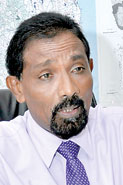News
Govt health motive on fertiliser cuts a load of compost, say critics
The government says it imposed fertiliser cuts to reduce the prevalence of chronic kidney disease among the farming community and is urging farmers to change over to using compost. These claims are being contested by critics who claim the shortage is a result of the government defaulting on payments to fertiliser importers. Companies confirmed last week that the Treasury owed them Rs. 15 billion in outstanding dues.

Agriculture Ministry Secretary Wijeratne Sakalasooriya. Pic by Susantha Liyanawatte
“This shortfall in fertilisers has badly affected paddy cultivation,” protested Kawdulle Dharmathilaka, Treasurer of the Pragathasheeli Govijana Ekamuthuwa. “The ministry is asking us to use organic fertiliser but it’s too late now. After using artificial fertilisers for years the soil has become infertile. This has made it necessary for us to keep applying artificial fertilisers.”
“Fertiliser imports have been reduced by 25 per cent because an increasing number of chronic kidney diseases are being reported from the areas of use,” Agriculture Ministry Secretary Wijeratne Sakalasooriya told The Sunday Times.
“We agree there was a shortcoming on the part of the Agriculture Ministry,” he said. “That was the failure to inform farmers around the country about the reduction. As a result, farmers used up all the fertiliser they had and expected some more. When we didn’t give them more, they started to protest.”
The quantity of fertiliser received by farmers was “more than enough” for paddy cultivation, the Secretary said, insisting that a reduction would not affect production. “They have not paid the private companies who import these fertilisers,” scoffed Hemakumara Nanayakkara, a former Agriculture Minister who holds a doctorate in the subject from the University of Peradeniya’s Postgraduate Institute of Agriculture. “As a result, there is a delay in buying fertiliser.”
The government owes arrears of up to Rs. 10bn to the companies, Mr Nanayakkara alleged. It is because they had failed to make these payments that the companies had stopped importing fertilisers. “If the government is not purchasing fertiliser, it must at least be available in the market at its original price,” he said. (The farmers buy the product at heavily-subsidised rates).
“The farmers are finding it hard to cultivate paddy this season.” Sources from fertiliser companies supported this claim. Requesting anonymity, a senior employee of one reputed firm said the Treasury owed the sector Rs. 15bn in outstanding dues. “The Treasury is paying us off in small amounts,” he revealed. “Private companies have gradually decreased the quantities of fertiliser they are importing”.
An average of 80,000 to 85,000 metric tons of fertiliser is used for cultivation. Of this, between 45 and 50 per cent is applied in paddy cultivation. While private companies import a bulk of the country’s fertiliser requirement, these are distributed to farmers by the government at subsidised prices.
Meanwhile, Mr Sakalasooriya said the government was keen to increase the use of natural fertiliser in Sri Lanka. He noted that, before the chemical fertiliser imports started in 1952, cultivation had depended entirely on organic fertilisers.“This is what we are encouraging the farmers to do now,” he stressed. “Latest research has proved that chronic kidney disease is caused by agrochemicals. We have decided to act fast in order to save the farming community and our future generations.”
Farmers were not partial to organic fertilisers because these took time to apply and required hard work. “Our farmers are used to a method whereby they take fertiliser off a packet without going through the three to four month process of producing organic fertiliser.”
Mr. Dharmathilaka, who is from the Polonnaruwa district, argued that the government had gradually decreased the quantity of fertilisers over a period of time. In contrast, Terence Gamini, a farmer from Rajanganaya in the Anuradhapura district, said farmers didn’t need agrochemicals at all. “The government says that last year it had spent Rs. 24,000 per acre, each season, to provide farmers with chemical fertiliser,” he observed. “I say, ‘give us that money and we will make compost’.”
“The soil gets degraded through the use of agrochemicals,” he agreed. “Last year, the government allocated Rs. 500 million to manufacture compost in the North Central Province. But this was not successful because officials were given the job and they took the money. Give the money directly to farmers and they will make the compost.”
The fertiliser issue was raised in parliament on Tuesday by JVP MP Anura Kumara Dissanayake. “In comparison with 2012, the import of urea has decreased by 30 per cent, Triple Super Phosphate (TSP) has decreased by 21 per cent while the import of Muriate of Potash (MOP) has decreased by 31 per cent,” he said.
Mr Dissanayake also said there had been massive delays in distributing fertiliser. “It was done three months after the Yala season started,” he pointed. “By now, fertilisers such as TSP are not even necessary.”
Mr. Sakalasooriya admitted to The Sunday Times that there had been a distribution lag. This was due to the Fertiliser Unit being shifted from the Agrarian Services and Wildlife Ministry to the Ministry of Agriculture. This change had taken place three months ago. However, they had needed time to streamline the new processes.
The government has already provided farmers with a solution to the problem, Mr Sakalasooriya added. This was to produce organic fertiliser.
“We have already given them equipment, technology and education,” he reiterated. “Now it is time for the farmers to change over, and to balance the use of organic and imported fertilisers to cultivate their crops. This will cut down the prevalence of the chronic kidney disease to which at least 100,000 people have fallen victim.”
Follow @timesonlinelk
comments powered by Disqus

